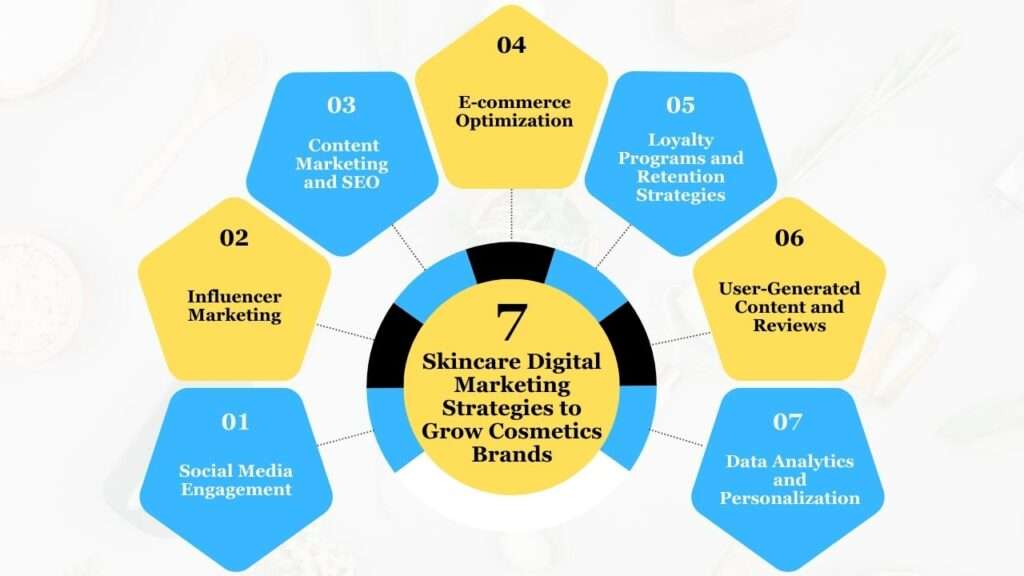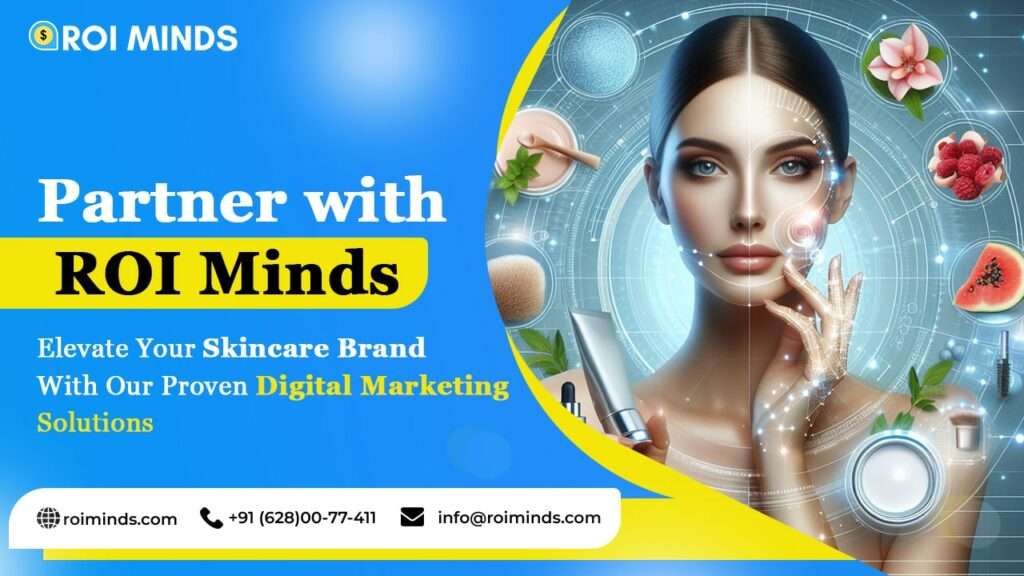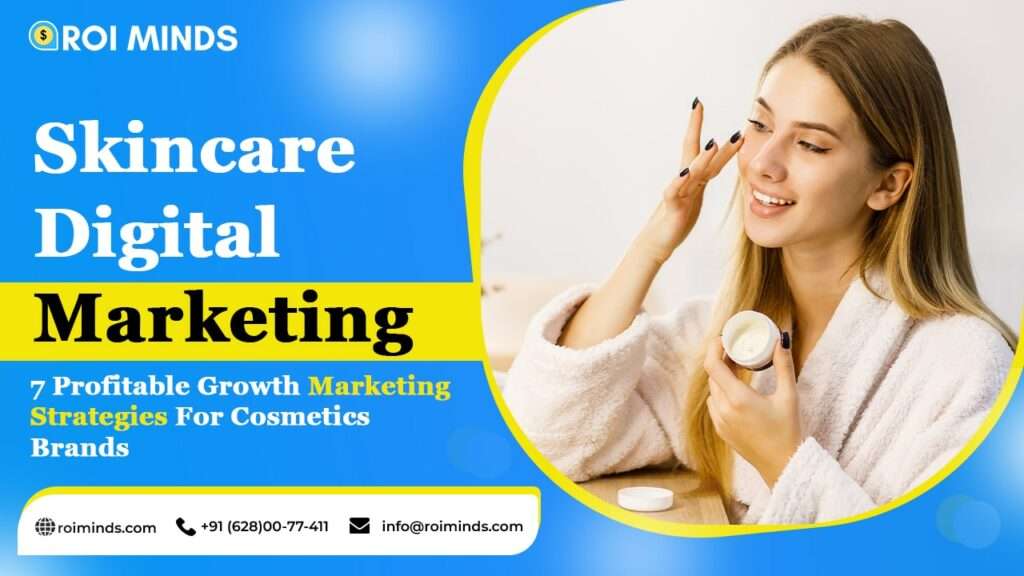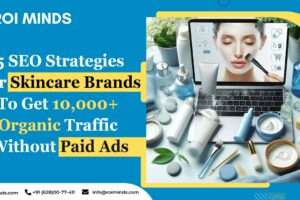Nowadays, the beauty products market is highly competitive! The demand for personal care products is skyrocketing, and experts predict this trend will continue. But with this growth comes fierce competition, especially in the ever-evolving world of e-commerce.
Remember those days of flipping through glossy magazines to discover the latest skincare trends? It’s a whole new game now. The digital age has transformed how businesses implement marketing cosmetics brands and connect with customers.
The digital revolution presents incredible opportunities! Imagine reaching a global audience with targeted messaging, fostering personalized connections, and building brand loyalty. All this is possible through creating engaging online content and interactive platforms.
In this blog, we’ll discuss the power of skincare marketing and the top 7 growth marketing strategies for cosmetics brands. Get ready to unlock the secrets to attracting new customers, retaining existing ones, and leaving the competition in the dust!
Understanding Skincare Marketing
The beauty industry is booming! A staggering statistic from Statista reveals the global cosmetics market is expected to reach nearly $129 billion by 2028. Consumers prioritize self-care and wellness, and skincare reigns supreme within this trend. Additionally, companies are using effective marketing for cosmetics to achieve growth in the industry.
Its focus on healthy, glowing skin has led to the “skinification” trend, where skincare benefits influence makeup and haircare choices. With a market share of 41% in 2022, skincare is projected to continue its dominance.
But how do you, as a brand, navigate this dynamic landscape and capture the attention of your ideal customer?
Skincare marketing goes beyond traditional advertising. It’s about leveraging the power of online channels to connect with potential customers exactly where they are. They can be scrolling through Instagram, watching beauty tutorials on YouTube, or researching products online. Unlike impersonal billboards or magazine ads, skincare marketing allows for a targeted and interactive approach.
1. Target Market:
A deep understanding of your target market is the foundation of any successful cosmetics marketing strategy, including skincare.
- Who are you trying to reach?
- Are you targeting millennials obsessed with K-beauty trends or working moms seeking natural, organic solutions?
Demographic factors like age, gender, and income are important but don’t forget about preferences, lifestyle, and psychographics (attitudes and values).
For example, a brand focused on sustainability might target eco-conscious consumers who value ethically sourced ingredients and recyclable packaging.
2. Trends:
Staying ahead of the curve is crucial in the ever-evolving beauty world. Social media plays a massive role in driving trends. Remember that viral celebrity look everyone’s trying to replicate? That’s the power of social media influencing beauty choices. A successful skincare marketing strategy must consider these trends.
For instance, the rise of the above-discussed trend presents an opportunity to highlight your products. Additionally, it can be integrated into a holistic skincare routine.
3. The Power of Social Media:
Speaking of social media, its influence can’t be overstated. Platforms like Instagram and YouTube have become hubs for beauty content creators.
Imagine having a dedicated audience of millions following makeup tutorials or skincare reviews featuring your products! These beauty influencers can be powerful brand ambassadors, building trust and generating excitement for your brand. A successful digital marketing agency can help in marketing cosmetics brands.
But social media is more than just influencers. The rise of social commerce allows for direct product purchases within these platforms.
Further, we’ll discuss specific tactics, such as creating engaging content, partnering with relevant influencers, and utilizing targeted advertising.
How to Craft the Best Skin Care Marketing Strategy?
So, you have a fantastic skincare line packed with the potential to transform lives. But before you unleash your marketing magic on the world, a crucial step lies ahead. It is crafting a marketing strategy for personal care products.
A well-defined strategy ensures your message reaches the right audience, resonates with them, and drives sales. Here, we’ll delve into the first two pillars of a winning strategy – understanding your brand and knowing your market.
Defining Your Brand Identity:
Your brand is more than just a logo and name. It sets you apart before you go ahead with your skincare marketing strategy. It’s about the unique value proposition you offer customers. What problems do your products solve? What makes them stand out from the competition? Here are some questions to ponder:
- Superiority: Do your products boast innovative formulas or unmatched effectiveness compared to others?
- Targeted Solutions: Do you address specific skin concerns, such as acne or hyperpigmentation? An effective cosmetics marketing strategy can help.
- Ingredient Focus: Do you prioritize organic, natural ingredients or cutting-edge science-backed formulas?
- Sustainability Commitment: Are eco-friendly practices and recyclable packaging integral to your brand values?
Avoid claims like “The world’s best skincare!” Instead, be specific. A statement like “Clean skincare with nature’s finest ingredients” clearly communicates your focus on high-quality, natural components and transparency.
Look to successful brands for inspiration. Glossier’s branding as “The New Beauty Essentials” positions them as offering simple, everyday skincare solutions. The Ordinary, with its “Clinical Formulations with Integrity” tagline, evokes trust in potent, scientifically backed formulas. Notice how their branding extends to packaging, highlighting active ingredients for an informed consumer. Additionally, notice what techniques of marketing for cosmetics have been implemented by them.
Knowing Your Skincare Market Landscape:
Now, let’s shift gears and delve into understanding your target audience and the competitive landscape. It is crucial for any effective marketing strategy for personal care products.
You wouldn’t try selling anti-ageing serums to teenagers. Identifying your core audience lays the groundwork for future product development, ensuring you cater to their needs and desires.
Here are some key details to gather about your ideal customer:
- Demographics: Age, gender, ethnicity, and income level.
- Lifestyle: Interests, hobbies, and location.
- Online Presence: Preferred social media platforms.
- Skincare Goals: What do they seek from their skincare routine?
- Current Products: What existing brands do they use?
- Motivations: What factors influence their purchasing decisions?
One can gather this data by analyzing your existing customer base, conducting surveys, or utilizing industry reports. A trusted agency can help you in marketing for cosmetics by working on data insights.
Understanding your competitors involves researching their marketing strategies. Go through their websites, ads, and social media presence.
- What aesthetic choices do they make?
- What messages do they use to connect with their audience?
- Are they targeting a sense of luxury or affordability?
By understanding your competitor’s strategies, you can identify potential gaps in the market and tailor your offerings accordingly.
You’ve solidified your brand identity and understood the skincare market, which is critical for building a winning cosmetics marketing strategy.
Stay tuned for the coming sections, where we’ll explore the strategies needed to translate your strategy into actionable steps. They can help drive customer engagement and brand loyalty.
7 Skincare Digital Marketing Strategies to Grow Cosmetics Brands
The beauty industry is booming, and with the rise of eCommerce, competition is fiercer than ever. But fear not! Here at ROI Minds, we understand the power of a well-crafted marketing strategy for personal care products.

1. Social Media Engagement:
Imagine reaching millions of potential customers on platforms like Facebook, Instagram, and Twitter. Social media advertising puts this power at your fingertips.
But it’s about targeting. These platforms allow you to know your ideal customer, customizing your ads based on demographics, interests, and online behaviour. They help marketing cosmetics brands to reach vast audience.
Social media marketing for skincare brands allows you to deliver messages to the people likely to relate to your brand.
You can track and measure your results in real time. See how many people saw your ad, clicked through, and ultimately purchased a product. It allows you to refine your strategy and optimize campaigns for maximum effectiveness.
2. Influencer Marketing:
Beauty influencers have become the new tastemakers of the industry, boasting millions of followers who trust their recommendations. Influencer marketing harnesses this power, allowing you to partner with influencers who align with your brand values and target audience.
Imagine a trusted beauty guru showcasing your products in a captivating tutorial or review. It connects with viewers, fostering trust and brand awareness. Don’t just throw money at celebrities.
Identify influencers who genuinely love your products and can create authentic content that resonates with their audience. Micro-influencers, with smaller but highly engaged followings, can also be a fantastic option for targeted reach. Additionally, implement an effective cosmetics marketing strategy for brands to achieve their targets.
3. Content Marketing and SEO:
In the world of skincare marketing, valuable content is king. It involves creating engaging blog posts, informative videos, and insightful social media content that attracts and retains your target audience.
You can reach the customers by providing solutions to their beauty queries, answering their questions, and offering expert advice. It positions your brand as a go-to resource and builds a loyal following of engaged customers.
But content marketing isn’t just about brand awareness. By incorporating calls to action, you can encourage viewers to explore your website and subscribe to your newsletter.
4. E-commerce Optimization:
Your website is the place where potential customers convert into loyal brand advocates. E-commerce optimization ensures a smooth and user-friendly experience, optimizing your website for conversions.
High-quality product images, informative descriptions, and clear navigation are all crucial elements. But it goes beyond aesthetics. Consider offering multiple payment options, streamlined checkout processes, and transparent product information.
Remember, online shoppers value convenience. Make their journey from “browsing” to “buying” as effortless as possible. Utilize marketing strategy for personal care products to help with the same.
5. Loyalty Programs and Retention Strategies:
Loyal customers are the support for any successful business. A well-crafted loyalty program fosters a sense of exclusivity and strengthens the bond between your brand and your customers.
Offering exclusive discounts, free samples, or early access to new products incentivizes repeat purchases and increases customer lifetime value. Utilize an effective skincare marketing strategy for the same.
These programs create brand advocates – happy customers who spread the word about your amazing cosmetics. Using these tricks, you can cultivate a loyal following that drives sustained growth for your brand.
6. User-Generated Content and Reviews:
Forget staged photos and glossy ads – today’s consumers crave authenticity. It consists of photos, and videos created and shared by your customers.
It showcases real people using and loving your products – a powerful tool for building trust and fostering community.
Encourage customer engagement by hosting contests and giveaways, urging them to share their experiences.
By actively seeking out and utilizing UGC, you create a more authentic and engaging brand experience for your customers.
7. Data Analytics and Personalization:
Data is the main pillar of any successful digital marketing strategy. You gain a deeper understanding of your target audience by analyzing website traffic, social media engagement, and customer purchase history.
Imagine knowing your customers’ preferred products, browsing habits, and purchasing triggers. It allows you to personalize your marketing efforts, delivering targeted content, product recommendations, and email campaigns that relate to them.
Data can also be used to identify trends and predict customer behaviour. It allows you to stay ahead of the curve, adapting your marketing strategies to meet the needs of your buyers.
There are numerous user-friendly analytics tools available to help you interpret and utilize this valuable information. Collaborate with a company to help in marketing cosmetics brands successfully.
Read More:
5 SEO Strategies For Skincare Brands To Get 10,000+ Organic Traffic Without Paid Ads
10 Skincare Facebook Ads Examples: Mastering Social Media Advertising for Skincare Brands
Future Of Digital Marketing For Skincare
The world of cosmetics is experiencing an exciting transformation! Social media and e-commerce have revolutionized the industry; now, we’re witnessing the rise of “beauty tech.” These innovative technologies aim to personalize and enhance the customer experience.
Imagine using apps to see how a new shade of lipstick looks on you or software that recommends skincare routines. The future of skincare marketing promises exciting advancements, with technology working hand-in-hand with improved formulas and products.
It can further solidify the beauty industry’s dominance in the marketing landscape. Prepare for a future where beauty goes beyond the surface, offering a truly customized and tech-driven experience!
How ROI Minds Can Transform Your Skincare Marketing Strategy:
✨Here at ROI Minds, we’re your one-stop shop for skincare marketing. We’re not just another eCommerce digital marketing agency. We’re a passionate team of experts who understand skincare brands’ unique challenges and opportunities.✨

1. Comprehensive Services:
We offer a full spectrum of digital marketing services to elevate your brand. It ranges from crafting content and building relationships with influential beauty bloggers to optimizing your website for search engines. ✨
2. Strategic Guidance:
We don’t just throw tactics at you and hope for the best. We take the time to understand your brand’s unique story and target audience. Then, we develop a data-driven skincare marketing strategy for personal care products that delivers real results.✨
3. Partner with ROI Minds:
Ready to transform your skincare marketing and achieve sustainable growth? Contact us today for a free consultation! We’ll show you how ROI Minds can help your brand stand out and attract more customers who love your products. Additionally, we will help your brand reach heights. ✨
Conclusion
The digital landscape presents a dynamic and ever-evolving playground for skincare marketing. It’s a space where you can connect with your target audience personally and effectively, fostering brand loyalty and driving sales.
Think of it as a conversation, not a monologue. The digital world constantly evolves, offering exciting opportunities to connect with your audience on a deeper level.
By implementing a well-rounded cosmetics marketing strategy, you’re actively engaging with potential customers, addressing their needs, and building trust. Additionally, it can help you position your brand for sustainable growth and success.





